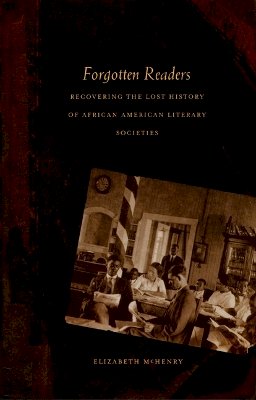
Forgotten Readers: Recovering the Lost History of African American Literary Societies
Elizabeth McHenry
Forgotten Readers expands our definition of literacy and urges us to think of literature as broadly as it was conceived of in the nineteenth century. Elizabeth McHenry delves into archival sources, including the records of past literary societies and the unpublished writings of their members. She examines particular literary associations, including the Saturday Nighters of Washington, D.C., whose members included Jean Toomer and Georgia Douglas Johnson. She shows how black literary societies developed, their relationship to the black press, and the ways that African American women’s clubs—which flourished during the 1890s—encouraged literary activity. In an epilogue, McHenry connects this rich tradition of African American interest in books, reading, and literary conversation to contemporary literary phenomena such as Oprah Winfrey’s book club.
Product Details
About Elizabeth McHenry
Reviews for Forgotten Readers: Recovering the Lost History of African American Literary Societies
Karla Holloway
News & Observer
"Forgotten Readers is that rare breed of book that both opens new avenues of scholarship and that your mother . . . will want to devour and then discuss with her mother and friends. . . . Like my best friend’s cooking or a can’t-put-it-down novel, Forgotten Readers leaves me both satisfied and wanting more. . . . McHenry brings African American literary studies into an exciting conversation about the inter-relation between writing, reading, authorship and publishing. Forgotten Readers is a signal contribution to nineteenth-century literary history, as enjoyable as it is important."
Gabrielle Foreman
Women's Review of Books
"Forgotten Readers shows that the African-American literary past that we tend to think of as recently rediscovered has been lost and found more than once. . . . Forgotten Readers makes the point that so much emphasis has been placed on the importance of oral culture in black life that we forget how much learning to read and write meant to black people, how they longed to appear as themselves in American literature."
Darryl Pinckney
New York Review of Books
